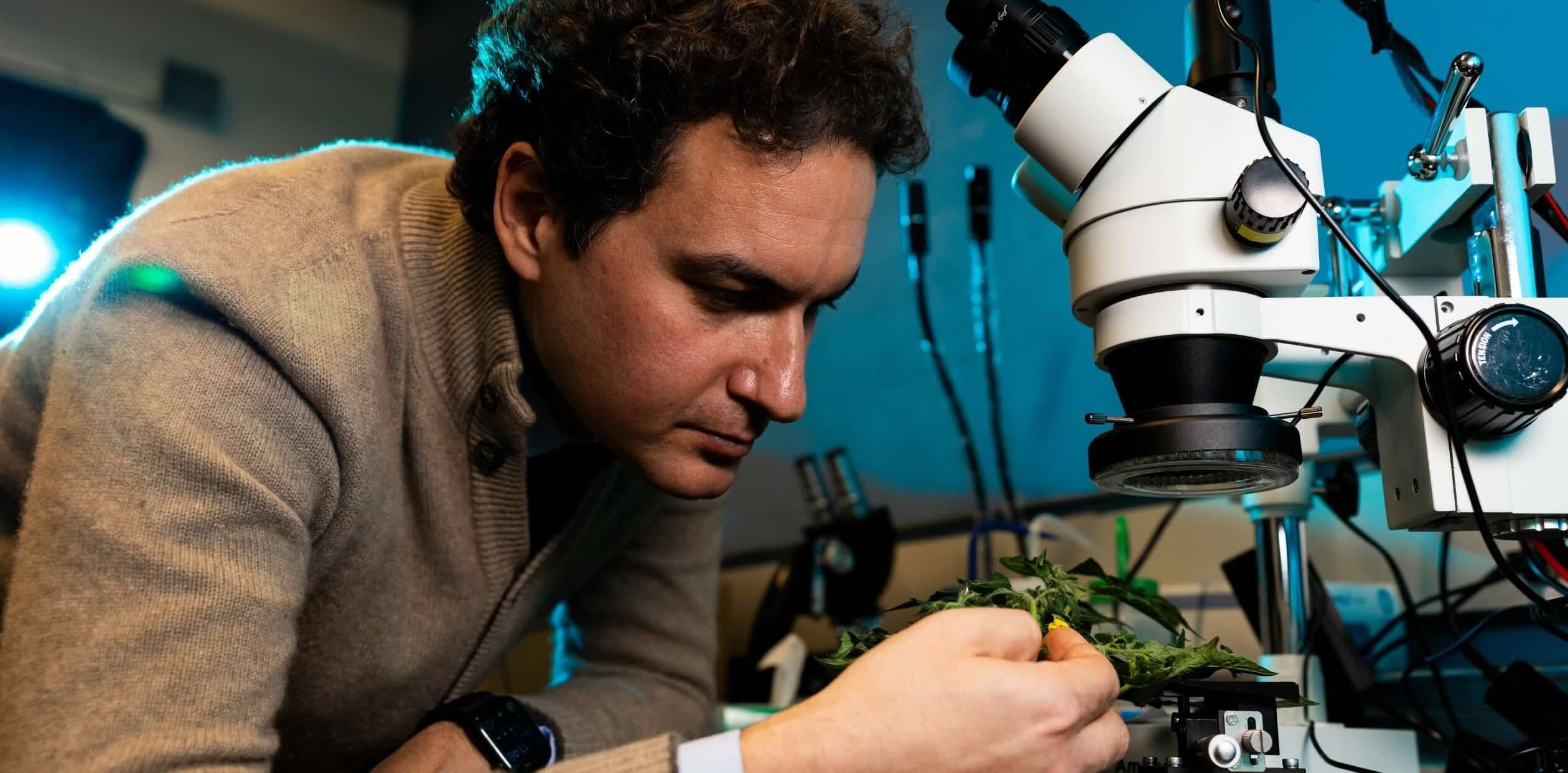MIT on
Climate Change
Number of MIT’s 1,080 faculty members working on projects to address climate change
Number of MIT’s five schools (and one college) whose faculty are working on questions related to climate change
Number of MIT OpenCourseWare courses on the topics of environment and sustainability

The Climate Project
Campus Climate Action
MIT’s role as a global leader in sustainability is strengthened by its commitment to be a test bed for decarbonization strategies and technologies.
Campus Emissions 0
MIT’s goal for direct campus emissions by 2050
Today I Learned: Climate podcast
Today I Learned: Climate (TILclimate) is MIT’s award-winning podcast that breaks down the science, technologies, and policies behind climate change, how it’s impacting us, and what we can do about it.

Climate Science, Risk and Solutions
This primer summarizes the most important evidence for human-caused climate change. It confronts the stickier questions about uncertainty in our projections, engages in a discussion of risk and risk management, and presents different options for taking action.

Featured MITx courses on climate change
Combining forces to advance ocean science
The combined strengths of MIT and the Woods Hole Oceanographic Institution (WHOI) joint program provides research and educational opportunities for PhD students seeking to explore the marine world.
Looking for more videos?
More about climate change from MIT
News
MIT in the media: 2025 in review
MIT community members made headlines with key research advances and their efforts to tackle pressing challenges.Study: More eyes on the skies will help planes reduce climate-warming contrails
Images from geostationary satellites alone aren’t enough to help planes avoid contrail-prone regions, MIT researchers report.How cement “breathes in” and stores millions of tons of CO₂ a year
New analysis provides the first national, bottom-up estimate of cement’s natural carbon dioxide uptake across buildings and infrastructure.Introducing the Minerals Stewardship Consortium at MIT
The consortium convenes industry, academia, and policy leaders to navigate competing demands and reimagine materials supply.Making clean energy investments more successful
Tools for forecasting and modeling technological improvements and the impacts of policy decisions can result in more effective and impactful decision-making.A new approach to carbon capture could slash costs
Chemical engineers have found a simple way to make capturing carbon emissions from industrial plants more energy-efficient.Resurrecting an MIT “learning by doing” tradition: NEET scholars install solar-powered charging station
The project was designed and built with novel “bio-composite” materials developed by the student team.When companies “go green,” air quality impacts can vary dramatically
Cutting air travel and purchasing renewable energy can lead to different effects on overall air quality, even while achieving the same CO2 reduction, new research shows.
Centers, Labs, and Programs
-
Abdul Latif Jameel Poverty Action Lab (J-PAL)
Through J-PAL's King Climate Action Initiative, J-PAL innovates, tests, and scales high-impact solutions at the nexus of climate change and poverty alleviation with governments, NGOs, donors, and companies worldwide.
-
Abdul Latif Jameel Water and Food Systems Lab (J-WAFS)
J-WAFS helps meet the needs of a rapidly changing planet by catalyzing research, innovation, and technology to improve access to safe and resilient supplies of water and food.
-
Building Technology Program
The Building Technology Program includes students, faculty, and staff working on design concepts and technologies that contribute to a more humane and sustainable built world.
-
Center for Energy and Environmental Policy (CEEPR)
CEEPR is a focal point for research on energy and environmental policy, and promotes rigorous, objective research for improved decision-making in government and the private sector.
-
Center for Sustainability Science and Strategy (CS3)
CS3 research aims to improve understanding of sustainability challenges and help decision‑makers address global change, enhancing well‑being for current and future generations.
-
D-Lab
MIT D-Lab works with people around the world to develop and advance collaborative approaches and practical solutions to global poverty challenges.
-
Environmental Solutions Initiative (ESI)
ESI is MIT’s campus-wide effort to mobilize the substantial scientific, engineering, policy, and design capacity of our community to contribute to addressing climate change and other environmental challenges of global import.
-
MIT Climate and Sustainability Consortium
MCSC is an academia-industry collaboration, working to accelerate the implementation of large-scale, real-world solutions to help meet global climate and sustainability challenges.
-
MIT Climate Nucleus
The Climate Nucleus is a faculty committee that has broad responsibility for the management and implementation of Fast Forward: MIT’s Climate Action Plan for the Decade.
-
MIT Climate Policy Center
The MIT Climate Policy Center serves as a non-partisan resource for policymakers who wish to advance evidence-based climate policy to help inform and support local, state, national, and international policymakers.
-
MIT Climate Portal
The portal offers educational information about climate change directly from MIT experts.
-
MIT Energy Initiative (MITEI)
MITEI connects researchers from across MIT and facilitates collaborations with industry, nonprofits, and government to speed and scale commercialization of no- and low-carbon technologies.
-
MIT Sea Grant
MIT Sea Grant is one of 34 university-based Sea Grant programs, encouraging local coastal and ocean stewardship and building collaborative infrastructures with academic, industry, government, and non-governmental partners.
-
MIT Sloan Sustainability Initiative
This group works to be a leading voice in sustainable business and policy, with a mission to provide the best education and apply academic rigor to real-world problems.
-
MIT Solve
MIT Solve's climate work selects and supports exceptional and diverse tech solutions from anywhere in the world that reduce emissions at scale or help communities adapt while reducing inequities and vulnerabilities.
-
Office of Sustainability
The mission of the Office of Sustainability is to transform MIT into a replicable model—one that generates just, equitable, applicable, and scalable solutions for responding to the unprecedented challenges of a changing planet.
-
Plasma Science and Fusion Center (PSFC)
Scientists at the PSFC are working to harness fusion energy on Earth, with the goal of designing power plants that will emit zero carbon, are safe, and incredibly power-dense.
In the Media
The Boston Globe
Prof. Desirée Plata, director of MIT’s Methane Network, spoke with Boston Globe reporter Kate Selig about how regional supermarkets are addressing their methane footprints. Plata notes that “grocers could make an impact through improving their waste management practices. And beyond operational changes, she said supermarkets can help shape the public’s understanding of climate issues,” Selig writes. “Most people go to the grocery store,” says Plata. “They have this great opportunity to educate people.”
Wired
In an opinion piece appearing in Wired, Prof. Elfatih Eltahir and postdoctoral researcher Yeon-Woo Choi examine the “ongoing water scarcity crisis” in Tehran. “With dry soils and high evaporation, rivers and wetlands shrank. Falling reservoir levels led to disruptions in hydropower generation, and water shortages prompted strict saving measures across parts of the capital,” they write. “These cascading impacts exposed how vulnerable Tehran’s infrastructure, economy, and communities have become under compounding heat and drought stress.”
The Quantum Kid
Prof. Peter Shor speaks with Katia Moskvitch and her nine-year-old son Kai of The Quantum Kid about how quantum technologies could be applied to developing climate change and sustainability solutions. Shor explains that quantum computers can be used for “simulating quantum mechanics, which would really help immensely in designing new materials, and new materials could be very useful for solving the climate crisis.”
New York Times
New York Times reporter Annabel Keenan highlights the “Remembering the Future” exhibit at the MIT Museum, a sculptural installation created by Janet Echelman that uses “climate data from the last ice age to the present, as well as projected future environments, to create a geometric design.” Echelman worked with MIT faculty, including Prof. Raffaele Ferrari and Prof. Caitlin Mueller, to bring the project to life. Mueller explains that she developed a “high-fidelity digital twin of the sculpture generated through our computational simulation that you can orbit and pan through to get perspectives that you can’t see physically in the space.”
Financial Times
Writing for the Financial Times, Principal Research Scientist Florian Berg explores “reasons to be hopeful about the resilience of efforts to tackle environmental issues at the corporate level.” Berg explains: “When looking at reporting on carbon emissions, ESG data and money invested in sustainable investment strategies, we can see big increases in recent years.”
Smithsonian Magazine
Noman Bashir, a fellow with MIT’s Climate and Sustainability Consortium, speaks with Smithsonian Magazine reporter Amber X. Chen about the impact of AI data centers on the country’s electric grid and infrastructure. Bashir notes “that the industry’s environmental impacts can also be seen farther up the supply chain,” writes Chen. “The GPUs that power A.I. data centers are made with rare earth elements, the extraction of which Bashir notes is resource intensive and can cause environmental degradation.”
DesignBoom
The MIT Museum presents “Remembering the Future,” a new installation by artist Janet Echelman in collaboration with Prof. Caitlin Mueller, reports Kat Barandy for DesignBoom. The installation suspends above the museum’s grand lobby and will be open to the public through fall 2027. “The work transforms climate data into a three-dimensional form that invites visitors to engage both visually and conceptually,” Barandy explains.
Fast Company
Fast Company reporter Elizabeth Segran spotlights “Remembering the Future,” a sculpture on display at the MIT Museum. The piece was created by artist Janet Echelman and “inspired by climate data guided scientists at MIT,” writes Segran. “The sculpture is “made from thousands of feet of plastic twine falls from the ceiling. Each strand of fiber represents the temperature of the planet over a period of time and the color signifies how hot it is, with blue and greens reflecting cooler climates than the reds and oranges. The sculpture goes all the way back to the ice age, but the most thought provoking part is our current moment, represented by a single yellow piece of twine. It then spreads out into a broad web that represents future centuries: Based on how we act right now, the future could look shockingly red or a calmer blue.”







